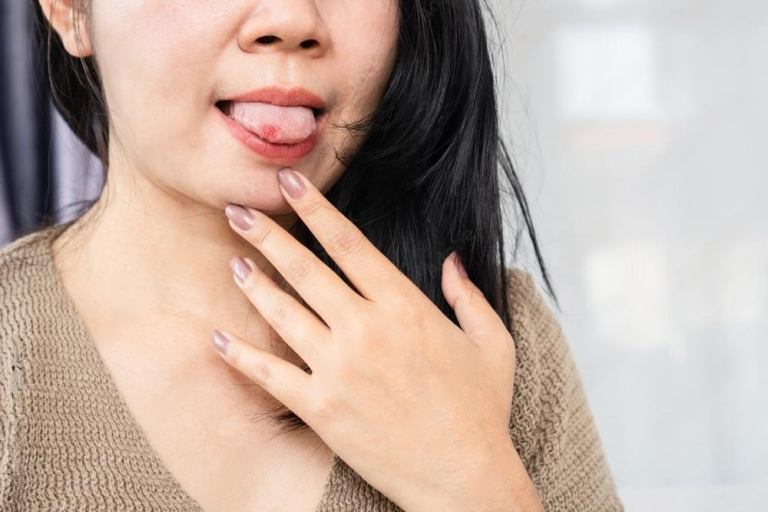
- Home
- About
- Our Team
- Services
- Postoperative Care
- Smile Gallery
- Medical Tourism
- Blog
- Offers
- Contact Us
- Home
- About
- Our Team
- Services
- Postoperative Care
- Smile Gallery
- Medical Tourism
- Blog
- Offers
- Contact Us

If you’ve ever felt the sharp sting of a canker sores on the tongue, you’ll know how these severe ulcers can disturb your daily routine. These painful sores can make it difficult to eat, drink, or speak. But what exactly causes these irritating blisters to appear?
In this blog, we’ll look at canker sores, including their probable causes, and treatments. We’ll also go over proven home cures and prevention strategies to assist you reduce the likelihood of recurrent breakouts. Whether you are a regular sufferer or simply interested in this prevalent condition, let’s explore the facts behind canker sores on the tongue and how you can take charge of your dental health!
Canker sores, sometimes called aphthous ulcers, are superficial ulcers that develop on the soft tissues of the mouth. It appears as a white or yellow lesion with a crimson border. Canker sores, unlike cold sores, do not spread and appear inside the mouth, usually on the tongue, cheeks, or gums.
Physical damage is one of the leading causes of canker sores on the tongue. Accidentally biting the tongue, eating sharp or abrasive foods, or using dental tools such as braces can all irritate the tissue and cause a mouth ulcer.
Emotional stress and physical weariness can impair the immune system, increasing the risk of getting canker sores. Many people report an increase in mouth ulcers during stressful times.
A deficiency in essential vitamins and minerals, including iron, folic acid, and vitamin B12, is frequently associated with canker sore breakouts. A balanced diet may help minimize the occurrence of these ulcers.
Certain foods might irritate the tongue, resulting in mouth ulcers. Common triggers include spicy, acidic, or salty meals like citrus fruits, tomatoes, and vinegar. If you discover that specific foods routinely create sores, you may want to avoid them.
Hormonal changes, especially during menstruation, pregnancy, or menopause, can cause canker sores on the tongue. This is more frequent in women and might be linked to immune system alterations.
Certain chronic health conditions, such as autoimmune illnesses, gastrointestinal problems like celiac or Crohn’s disease, and viral infections, can all contribute to the development of canker sores. If you have frequent or severe sores, you should visit a healthcare expert.
Although canker sores on the tongue usually cure on their own within 1-2 weeks, there are a few therapies that can help relieve discomfort and encourage healing:
Topical gels and ointments: Over-the-counter therapies such as benzocaine, hydrogen peroxide-based gels, and corticosteroid ointments can numb the sore and decrease inflammation, offering fast relief while also building a protective barrier.
Oral Rinse: Mouthwashes with antiseptics, such as chlorhexidine or dexamethasone, can help relieve inflammation and discomfort while preventing infection. Regular usage can accelerate recovery and avoid additional discomfort.
Nutritional Supplements: Supplementing with vitamins B12, iron, or folic acid can help minimize the frequency of sores, particularly if they are caused by deficiencies. Zinc pills might also improve recovery.
Laser therapy: Some dental facilities use low-level laser treatments, which can dramatically accelerate the healing process. This therapy relieves pain and inflammation in minutes and can minimize the length of the sore.
Prescription Medication: For severe or recurring canker sores, doctors may recommend harsher topical treatments or oral medications such as corticosteroids, which lower inflammation, or immune-modulating therapies to limit outbreaks.
By following these instructions, you can reduce your chances of getting canker sores on the tongue.
Canker sores on the tongue are more than just minor discomfort; they frequently indicate underlying concerns that require care. While these sores normally heal on their own, controlling the pain and supporting rapid healing is essential.
If you notice that canker sores are recurrent or causing substantial discomfort, consulting with a healthcare expert can offer you specific remedies and help address any underlying health issues. Taking preventative measures and understanding your body’s signals can help manage and avoid future outbreaks. Paying attention to your body’s signals and getting appropriate treatment can help you manage and reduce the severity of these painful sores.